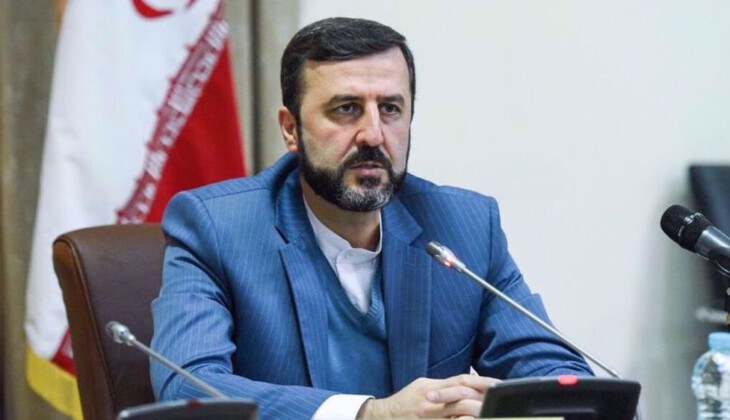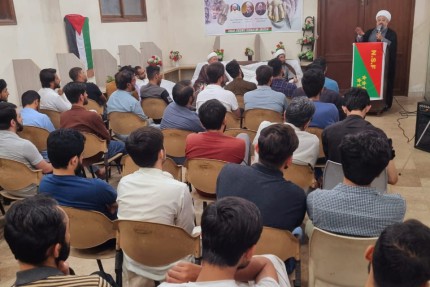Unsubstantiated claims against Iran will damage UN credibility

Iran’s top human rights official has rejected claims made by United Nations Secretary General Antonio Guterres against his country, warning that repetition of such "unsubstantiated allegations" will discredit the world body.
Kazem Gharibabadi, Secretary General of Iran’s High Council for Human Rights, made the remarks in a tweet on Saturday in reaction to the latest report by the UN chief on the situation of human rights in Iran, which accused the country of using excessive force against dissidents and protests.
“Covering only less than 1% of our views, a glimpse of @antonioguterres report was enough to reject claims that the report contains info. presented by the Iranian Govt,” tweeted Gharibabadi, who also serves as vice-president of Iran’s Judiciary for international affairs.
He added that copy-pasting such unsubstantiated allegations, which have been churned out by the former UN special rapporteur on the situation of human rights in Iran, Javaid Rehman, “tarnishes the UN credibility.”
The UN secretary general submitted an interim report on Iran’s human rights situation on June 16 — covering the period from June 11, 2021 to March 20, 2022. The interim report would be presented to the Human Rights Council at its 50th regular session, to be held from June 13 to July 8 this year
Comment
- Behind the Scene of the Attack in Oman, Operating Schemes that Intend to Destabilize the Country
- Trump’s Assassination Was a Ridiculous and Pre-organized Drama
- The Syrian senior analyst Views Towards the Letter of Iran’s President -Elect to the Secretary General of Hezbollah of Lebanon
- The hard way to political agreement in France/ Will Macron remain in power?
- Navigating the Caspian: Energy, Trade, and Geopolitical Harmony
- Behind the Scene of the Attack in Oman, Operating Schemes that Intend to Destabilize the Country
- Trump’s Assassination Was a Ridiculous and Pre-organized Drama
- The Syrian senior analyst Views Towards the Letter of Iran’s President -Elect to the Secretary General of Hezbollah of Lebanon
- The hard way to political agreement in France/ Will Macron remain in power?
- Navigating the Caspian: Energy, Trade, and Geopolitical Harmony
- Holding Public Court in Damascus to Put the Zionist Regime on Trial
- Boycotting Israeli Athletes for the Olympics in France Is Indispensable
- Iraqi Media Activists Arrested in Saudi Arabia/ Using the Hajj pilgrimage for settlement with the opponents
- Syrian Journalist and Author Tabib Ahmad Al-Darzi’s Analysis on Ali Bagheri’s Trip to Syria
- What Does it Mean on the Verge of Collapse and Has Israel Reached This Stage
- We Stand in an Era of Fundamental Changes/the World’s Political Literature is Changing
- The Art of Soft Power: How Khomeini and Khamenei Used Words to Transform the World
- Mey Sobhi Khansa’s views towards the Hague court verdict and the martyrdom of I R Iran president
- Behind the Scene of the Attack in Oman, Operating Schemes that Intend to Destabilize the Country
- Trump’s Assassination Was a Ridiculous and Pre-organized Drama
- The Syrian senior analyst Views Towards the Letter of Iran’s President -Elect to the Secretary General of Hezbollah of Lebanon
- The hard way to political agreement in France/ Will Macron remain in power?
- Navigating the Caspian: Energy, Trade, and Geopolitical Harmony
- Holding Public Court in Damascus to Put the Zionist Regime on Trial
- Boycotting Israeli Athletes for the Olympics in France Is Indispensable
- Iraqi Media Activists Arrested in Saudi Arabia/ Using the Hajj pilgrimage for settlement with the opponents
- Syrian Journalist and Author Tabib Ahmad Al-Darzi’s Analysis on Ali Bagheri’s Trip to Syria
- What Does it Mean on the Verge of Collapse and Has Israel Reached This Stage




